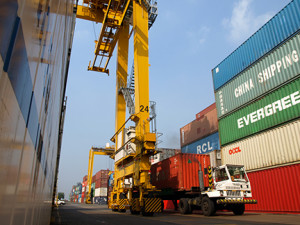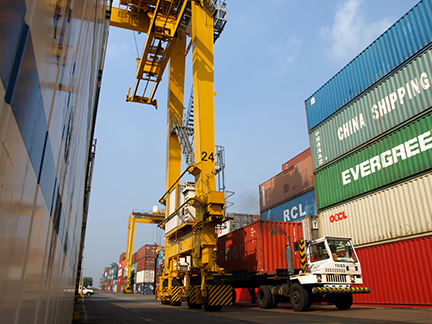
The Land Transportation Franchising and Regulatory Board (LTFRB) has unbundled trucking rates for containerized cargo bound for or coming from Manila ports.
“In consultation with truck-for-hire operators, importers, exporters, various chambers of commerce and trade associations and other stakeholders using the Port of Manila, we have decided to unbundle the trucking rates to make them fair and transparent,” LTFRB chairman Winston Ginez said in a public advisory.
Trucking rates will be unbundled to identify base charges and port congestion-related charges, Ginez explained.
The base charges will be the last trucking rate agreed upon by the truckers and importers, consignees, and exporters prior to congestion at Manila ports, as provided for in their trucking or hauling contract.
The base charges are inclusive of 14 hours of waiting time, including delays in the warehouse due to loading/unloading of cargo and issuance of gate pass, waiting to return empty containers at depots, and detention at port to withdraw laden/empty containers.
On the other hand, port congestion-related charges, which are on top of the base charge, shall be negotiated by and agreed upon by the truck operators and importers/consignees before the additional rates are imposed.
According to LTFRB, truck operators have incurred other port-related charges brought about by the port congestion.
The Confederation of Truckers Association of the Philippines (CTAP), Integrated North Harbor Truckers Association and Alliance of Concerned Truck Owners and Organizations increased their rates by at least 50% after the Manila truck ban policy was implemented on February 24 due to longer turnaround time for trucks. There are anecdotal reports, however, that truck rates have been jacked by as much as 300%.
Port congestion-related charges include truck detention charges where cargo trucks whether at warehouses or empty depots experience anticipated/expected delays in the return of empty containers, LTFRB said.
Another type of congestion-related charge is the cycle completion adjustment charge pertaining to adjustments in transaction flow and completion due to port congestion, restricted movements and limited time of operation, the agency added.
When a truck returns or withdraws empty containers in depots located in locations not within their route, this will also be treated as delivery and charged separately.
Other conditions that would entail added costs to the trucking operations, such as the use of special equipment, alternative routes, irregular/erratic schedules, and other special arrangements will also fall under other port congestion-related charges.
“We want to be fair with both the cargo operators and importers/consignees, hence we have come up with the advisory that can serve as a deterrent to truckers who are abusing the traders by imposing unreasonably high trucking fees,” Ginez said, adding that high trucking fees have a significant economic impact on consumers due to the pass-on charge imposed on commodities.
CTAP president Ruperto Bayocot told PortCalls in a text message his group agrees with the new LTFRB order on a “case to case basis”, depending on the destination of the cargo.
He noted that truckers still have the liberty to prescribe port congestion-related charges. – Roumina Pablo






can you send me the breakdown of charges that LTFRB is intending to ‘unbundle”?
thanks,
george
Can you share with me the LTFRB Unbundled Rates please?
LTFRB did not release a specific matrix for the rate unbundling. The agency only says that trucking rates will be unbundled to identify (1) BASE CHARGES and (2) PORT CONGESTION-RELATED CHARGES.
The base charges are the last trucking rate agreed upon by the truckers and importers, consignees, and exporters prior to congestion at Manila ports, as provided for in their trucking or hauling contract.
The base charges are inclusive of 14 hours of waiting time, including delays in the warehouse due to loading/unloading of cargo and issuance of gate pass, waiting to return empty containers at depots, and detention at port to withdraw laden/empty containers.
Port congestion-related charges, which are on top of the base charge, shall be negotiated by and agreed upon by the truck operators and importers/consignees before the additional rates are imposed.
As you can see, much of the final rate seems to still be subject to much negotiation.
300% Increase in Trucking Rates is NOT ANECDOTAL…IT HAPPENED.
Comments are closed.